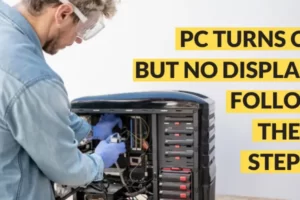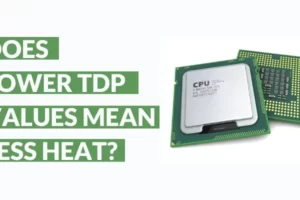Solid state drives are all the rave in the computer world now. And for all the good reasons.
They have been seeing consistent drop in prices and the overall performance boost they give your computer is huge.
Especially when you compare it with a rotating disc hard disk drive.
In the last five years, if I have to choose the most prominent and undisputed technology incorporation in the pc hardware space, its solid-state drives.
I am so excited to speak and write about SSDs that I can go on and on about this stuff.
But you know what in this post let’s keep things strictly around the gaming chatter.
Let’s see in what ways can an SSD improve your gaming performance.
Allow me to answer the question for which you are here for right off the bat.
Does SSD improve gaming performance?
The answer is yes, but not necessarily in the direct sense you would want it to.
Incorporating an SSD in your computer will make your system very responsive, will improve application and game loading times, it will smoothen out your gameplay and remove micro stutters in drive intensive games. But if you wish to improve your core fps, you will have to look into upgrading your graphics card and a CPU possibly to match it if it can’t.
So, you see the real question here isn’t does SSD improve gaming performance but will an SSD improve my overall gaming and pc performance. Then heck yes, it will.
Ok but I don’t want you to be satisfied with the short answer yet.
You see in tech unlike life you have the liberty to get as technical or as analytical as possible.
So, in the subsequent sections let’s just go ahead and see from different perspectives how exactly the incorporation of an SSD will improve your PC’s performance.
Come along my dear, it will be fun.
Let’s take it from the top shall we.
So what is an SSD and what does it do?
Okay then.
What exactly is an SSD and why so much fuss around it?
And how better is it in comparison to an HDD (hard disk drive) really?
An SSD or a Solid-State Drive can very well be called a spice of brilliance in storage technology.
A solid-state drive is structurally different than a hard disk drive.
It replaces the spinning mechanical disk structure of a hard disk drive by using a flash-based memory which for all intents and purposes is significantly faster.
The reason why an SSD makes your system more responsive and improves loading times is because of its massive read and write speeds.
It is tasks such as moving and copying where you will the difference is speed most profoundly.
On an average HDD, the copying takes place at a speed of 30 to 150 MB/s.
Compare that with the speeds that a normal SATA SSD offers which is around 500 MB/s.
And that is just the starting point, the speeds can go up to 3,000-3,500 MB/s on some new NVME SSDs.
Similarly, when you open an application in Windows, there is a whole plethora of smaller files that that get come into action to run it.
The faster the disk can read or write these files or blocks, the snappier and responsive your system will be.
In HDDs this happens at a rate of 01. To 1.7 MB/s and on the other hand an SSD can carry out these small read-write operations at a rate of 50-250 MB/s.
Now you can try and visualize the difference in responsiveness you are going to experience in your computer’s performance if you install an SSD into it.
The PC on which I am writing this post has a Samsung 960 EVO installed and it takes somewhere around 8-10 seconds to boot every time 😊.
I hope that gives you a fair bit of an idea how an SSD can do wonders for your system if you are still on an HDD.
Does SSD affect fps?
Okay so getting back to gaming. Does incorporation of an SSD improve gaming performance in terms of improved FPS?
The answer to this question is it may to a certain extent in certain games improve the average fps but in most cases it won’t and in order for you to have higher fps you need a good match of CPU and GPU.
The games for which you may see a larger average fps are those which are coded to be hard drive intensive (example: Arma 3). While most people do believe that incorporation of an SSD will only improve loading times in games, but for games like Arma 3 that loads continuously and streams from your drive, you will get a much smoother experience with an SSD.
So, incorporating an SSD can improve the gaming performance of your system subjective to how the game was designed.
So, the core fps won’t increase in all cases because for most of the titles the textures will get loaded into VRAM but for certain open world games such as GTA V and PUBG may benefit from increased average fps because the game is loading environment from an SSD and not an HDD.
However, let me also tell you this.
More fps in gaming should not be your reason to get an SSD in its first place.
We have all heard the statement that the chain is as strong as the weakest link, right.
Guess, what is the weakest link in your PC.
Your CPU, your GPU and your RAM work at blazing fast speeds.
And in the chain of operation there is your spinning mechanical hard drive.
So, get an SSD to improve the overall performance of your system which will include an overall performance bump in your games(in loading times and responsiveness).
And mark my statement here.
Once you install an SSD on your system.
You never go back.
There are two PC parts that I firmly stand behind upgrading.
One is a better power supply unit and the other is an SSD.
Whenever you ask me whether I should upgrade any of this, my answer is always yes.
SSD vs HDD gaming performance
Okay, I know, I know.
Many of you are number freaks. Lol.
You may still want to see some benchmarks won’t ya?
It’s alright, its alright if you don’t trust me.
I mean we just met, right?
Let me just show you some benchmarks which will what I just said above into perspective.
First off, let’s look at some gaming benchmarks.
All the other peripherals are kept consistent in the testing process and only an HDD is replaced for an SSD.
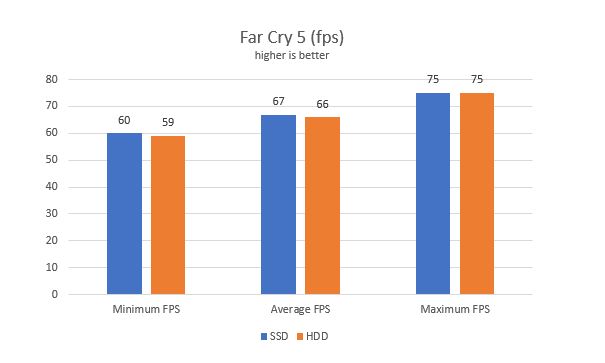
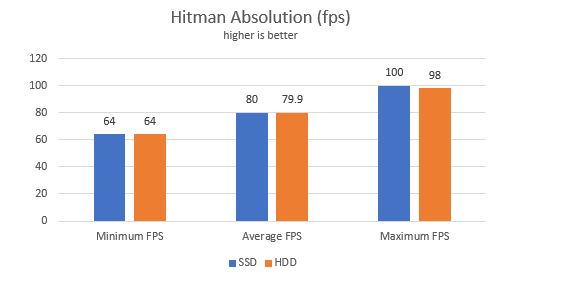
So, in these graphs you can very clearly perceive what’s going.
True to our conclusion above there is no profound increase in the fps department when replacing an HDD with an SSD.
But wait a minute.
Don’t you dare trot about saying there is no point in getting an SSD.
Check the graph below by Gamers Nexus.
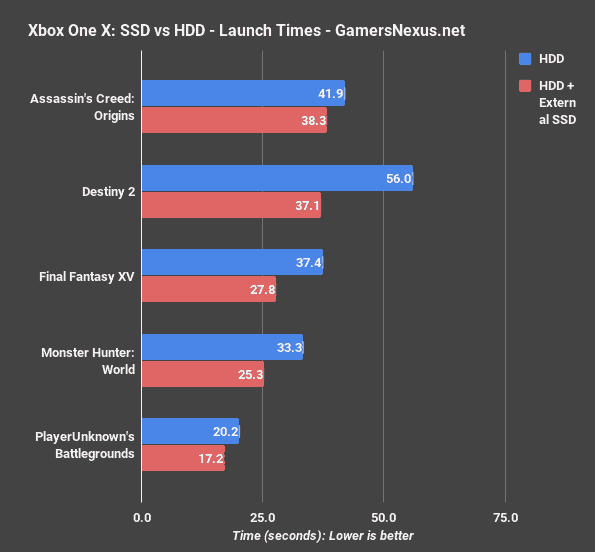
You can now clearly see the massive difference in game loading times on a system that has an SSD installed.
So concludingly if we talk in strict gaming terms, gamers won’t see a lot of performance bump in the core fps department.
But if you talk about an overall system and gaming performance, an SSD is just not the pc component you can afford to miss out on.
In addition to loading the core game files faster a system that has an SSD installed will see faster load times when you go from the game menu to go the game itself and vice versa.
The shift isn’t of course as profound as the game loading times but in high paced titles everything counts doesn’t it.
Also, it is important to point out use cases that are similar to mine.
I use my computer to write, edit and game up on.
Well, truth be told I haven’t played a lot of games on this system because I am not getting any spare time :P.
But I am sure there are people like me out there who use their pc for gaming as well as content creation (video editing, animation, motion graphics and what not).
If you are one of us, my friend, get an SSD now.
It’s quite alright if you have to eat just once a day to save up. Get an SSD. :p
I am just kidding, health before wealth partner.
Point being if you use your tasks for purposes other than gaming, an SSD will give your productivity a significant boost.
Check out the build I use to create all content on. I created it myself.
I am very proud 😊
Does having games on ssd improve performance?
Now that’s again a very good question.
The answer is yes, if you have been storing and playing your games off your spinning mechanical hard drive you will see a significant boost in loading speed and responsiveness when your games and other necessary apps from your HDD to your SSD.
But I get why someone would ask this question.
I mean we just discussed that installing an SSD doesn’t give a fps boost anyway.
There are two reasons for this,
First, which is of course obvious and that is decreased loading times and improved responsiveness.
And the second reason, though subtle is that, the in-game switch from game menu to the gameplay becomes faster.
Also, for open world games such as ARMA 3 which are coded to stream from the hard drive directly you will see noticeable drop in micro stutters and increased average fps.
So, this is what I suggest and in fact this is what I did on the system I am writing this post on.
The best way to go about is to build a system that has both SSD and an HDD if for some reason you can’t get a high capacity SSD.
Even a 250 GB SSD will do.
Install your operating system, most used apps and the games that you are currently playing on your solid-state drive.
And use the hard disk drive to store your raw log files, archives, game files, movies and what not.
This is what I do and this will actually save you a lot of money if you are on a budget and at the same time will give you the experience that you want.
Does SSD speed matter for gaming?
Another very important question when it comes to evaluating SSDs for gaming performance.
Does SSD speed matter for gaming and what is a good SSD speed that one should opt for?
Honestly speaking, when it comes to gaming PCs, the difference will be too small to notice whether you have an M.2 NVMe PCIe SSD or a less expensive SATA SSD in core loading times. While the high-end SSDs do offer better technology and higher speeds, but in gaming scenarios the difference will be too small to notice with respect to the price you are going to pay.
Let’s look at some benchmarks which will clear things up to a great extent.
Tweaktown conducted a test where they tested over 120 SSDs featuring different technology, protocol and speeds.
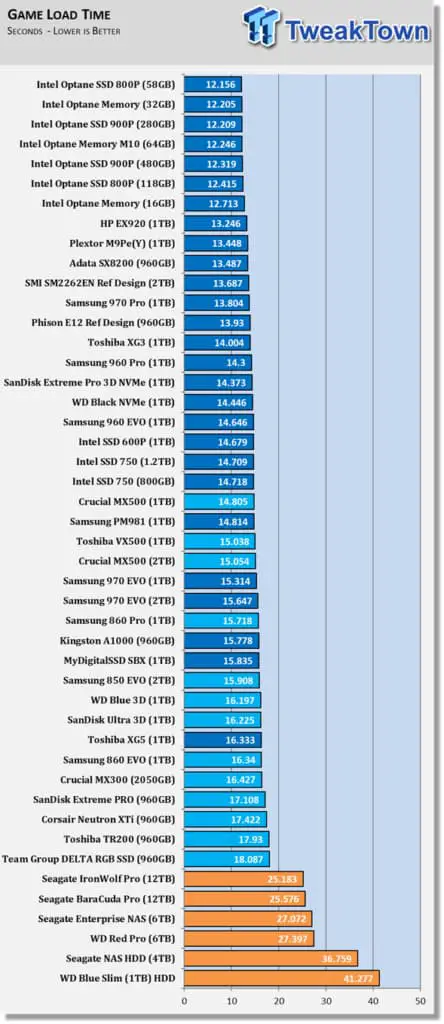
You can see the massive decrement in load times when switching from HDDs to SSDs.
But at the same time you can see that the difference between game load times of the top spec Intel SSD 800P and the standard Samsung 960 EVO SATA SSD is somewhere around 1.8 seconds.
That doesn’t look like much of a performance boost for the premium you are going to pay for it.
So, what I suggest is if you are looking at SSDs strictly from a gaming eye. It really doesn’t make sense to unload too much cash into them(unless you are Richie Rich of course).
Just go with the best capacity to price option that is available with respect to the warranty the manufacturer is offering and you will be set.
Does SSD brand matter?
Another very important FAQ that needs to be addressed.
Whenever someone sets out to build a computer or set out for pc parts hunting.
The biggest challenge they encounter is, and it can be rightly expressed by the phrase they utter, “there are just so many of them”.
And rightly so for every pc part you pick the market is riddled with copious amounts of manufacturers for each of those parts.
SSDs are no different.
However, the good thing is you usually don’t go wrong too much with any of these brands.
Because most of these brands in order for them to remain at the top of their game in this industry need to continuously improve and upgrade.
So as far a SSDs go.
Does SSD brand matter?
I would say stay away from brands that you haven’t heard anything about or fail to find a lot of reviews on. Just because someone said that SSD brand don’t matter too much doesn’t mean pick the first one you find. There are many replicas out there fishing for misunderstood purchases.
Secondly, just because a brand is big doesn’t mean all the SSDs that they have produced are good.
For example, Crucial makes incredible SSDs but their BX200 model was a failed trial. It renders up a lot of performance problems on large file transfers.
But the MX series Crucial SSDs are great picks.
Kingston V300 is another example where they tried to replace one of their best memory controller with one that is known to produce a lot of performance issues.
Companies do a lot of testing at the market level to get feedback on how their products are performing.
And on the basis of these feedbacks, they create improved products.
So, the best way is doing a little bit of research on the SSD you have your eyes on.
But don’t worry, I have created a separate post on the best SSDs for gaming that I regularly update. You can just directly go ahead and pick the one with your eyes closed.
I mean, not completely, just pick one that fits your budget and hit buy now.
These are some brands you will have a hard time going wrong with.
- Samsung: I haven’t heard any good SSDs from Samsung getting RMA’d. Just do a little google search on the specific product you have your eyes on and you will be fine.
- Crucial: I upgraded my laptop with a Crucial MX500 250 GB SSD and it breathed new life into my boi.
- Intel: Though I haven’t personally installed an Intel SSD in one of my systems but I have seen them in operation and they have overall good reviews and outlook.
- WD
- Sandisk
- ADATA
Again, the point to remember here is that just because a company is reputed doesn’t mean all products are just glory.
A little bit of research goes a long way.
I maintain this list regularly to only include the best SSDs for gaming. You can pick the one that suits your budget.
What is better upgrade SSD or ram for gaming?
So, this is how you proceed.
Have you ever had SSD on your system?
If the answer is No. Then a good SSD is the first thing you need to get your hands on my friend.
Not just with respect to gaming.
Of course, you are going to experience incredible game loading speeds with an SSD in your system as we just discussed.
But the overall enhanced PC experience that you will get from your system is something you won’t be able to look back from.
So, get an SSD and grab RAM later if you can’t afford the upgrade right now.
How much RAM is enough is a very common debate among PC enthusiasts and for the most part it is agreed that at this time a minimum of 8 GB is essential for your PC to perform well.
But with the kind of demands that I am seeing everyday from applications and games I would say that we are quickly entering a time where 16 GB will become the norm.
So, if your computer for some reason is rocking a 4 GB stick.
I would say, you are due for an upgrade in both RAM and SSD department.
The ideal upgrade chart for you should be SSD > An 8 GB RAM Stick > Another 8 GB RAM Stick in dual channel in the future.
If you frequently use your computer for heavy tasks beyond gaming like video editing, animation and resource heavy software associated with it, I would say your system needs 16 GB(high speed RAM) coupled with a multi-threaded CPU and a good quality SSD to infuse life into your work flow.
And the upgrade chart should be a good multi-threaded CPU with many cores(Ryzen is your savior) > 16 GB RAM (dual channel with equal or above 3000 Mhz speed) + at least 1 TB SSD.
If you can’t get them all right now, that is at least something you need to aspire for, for your use case.
So, with that we are at the end of this QNA post that started with answering the simple question does SSD improve gaming performance.
Hope you don’t mind that I took the question and covered all necessary questions as well, that surround SSDs and their impact on pc performance especially gaming performance.
If you have any other queries regarding the topics discussed or if you want some other question answered don’t forget to leave the question in the comments section below.
Subscribe everywhere, take great care of yourselves and I will see you in the next one.
Bbye 😊

